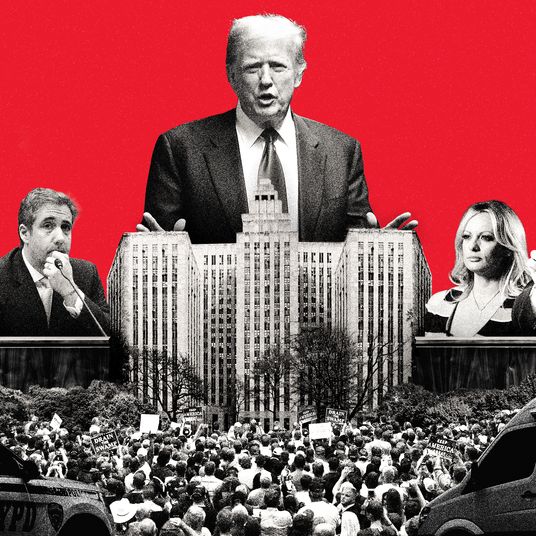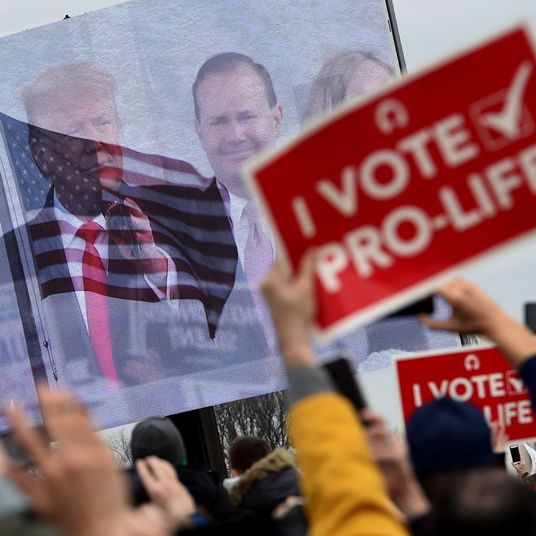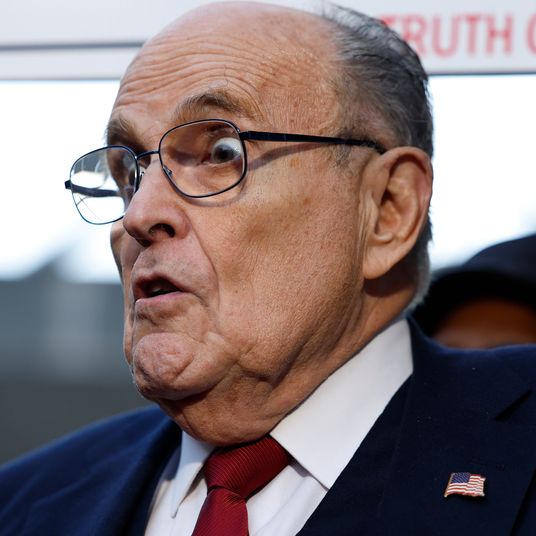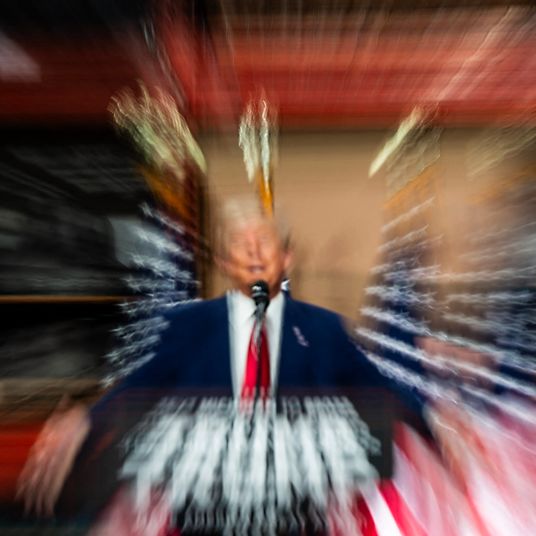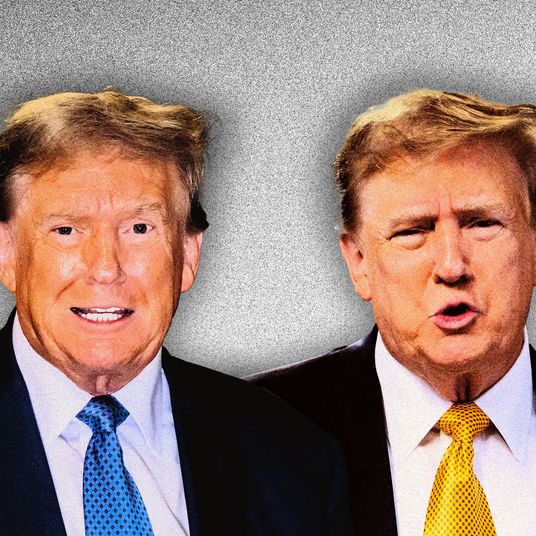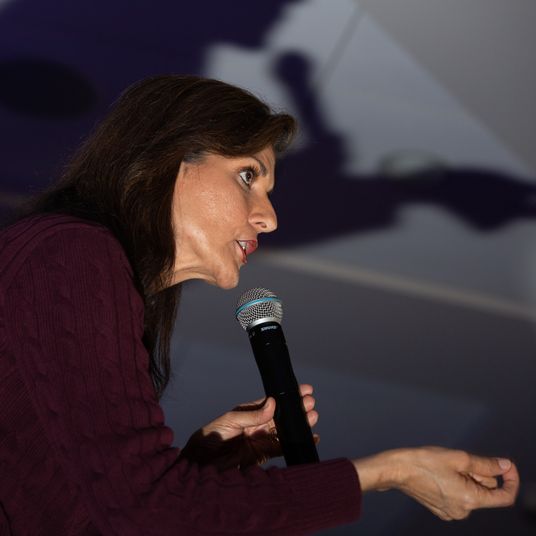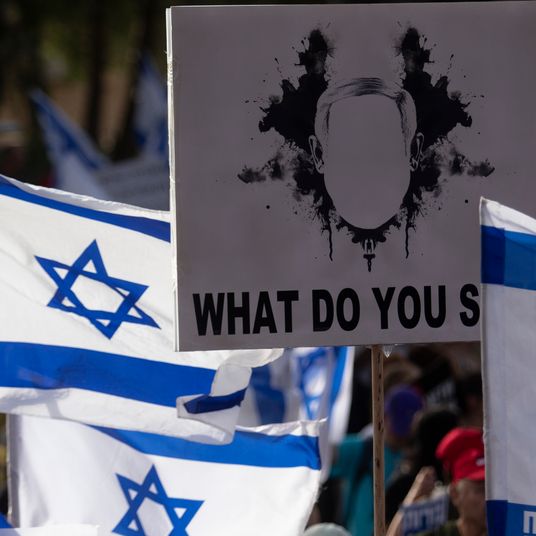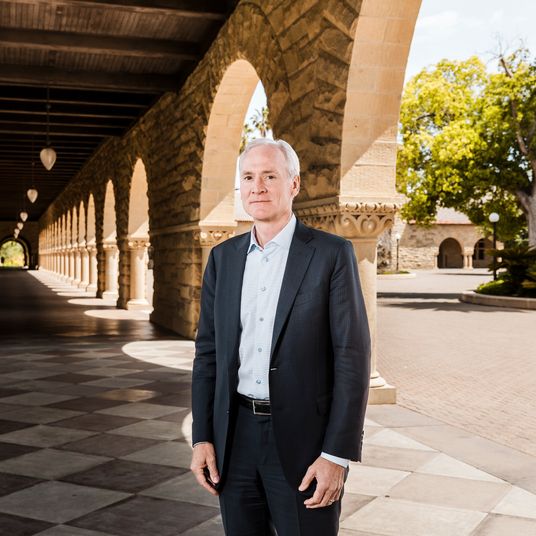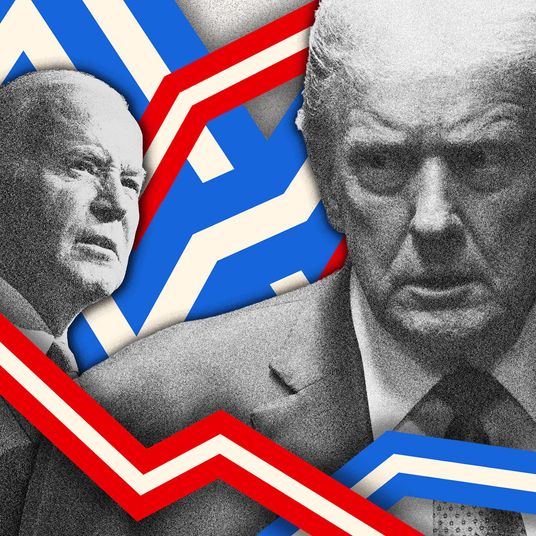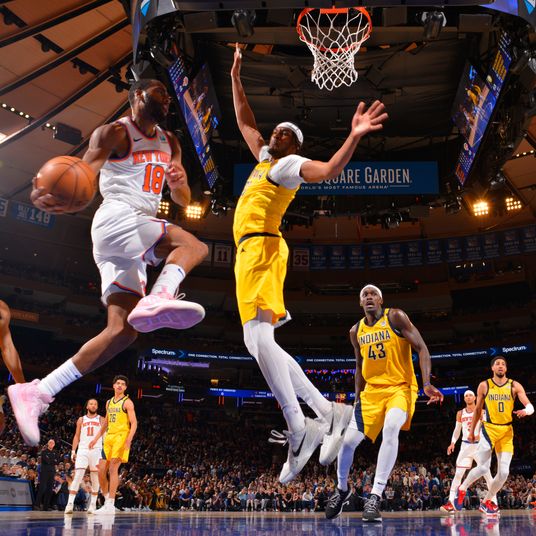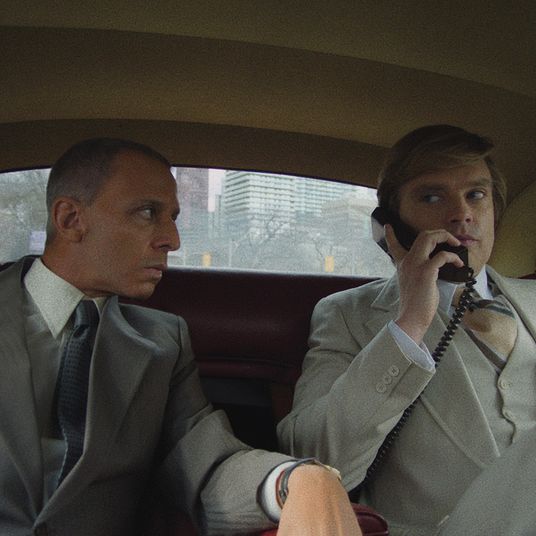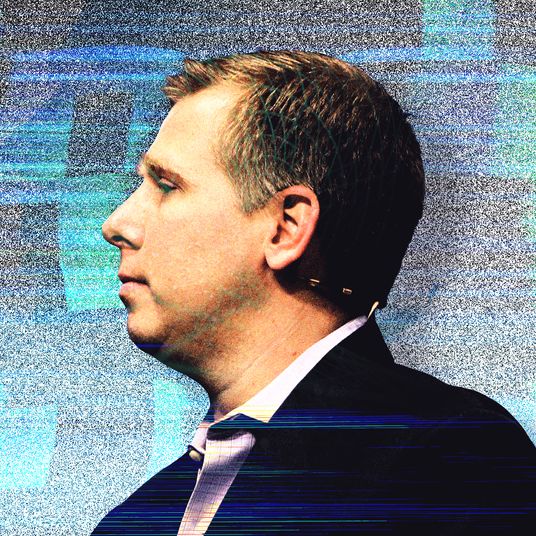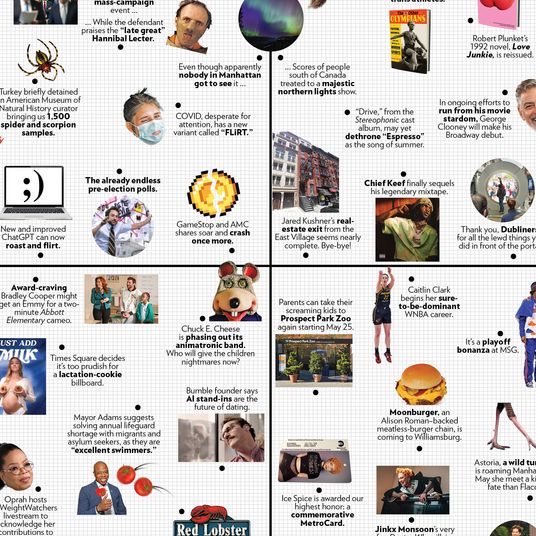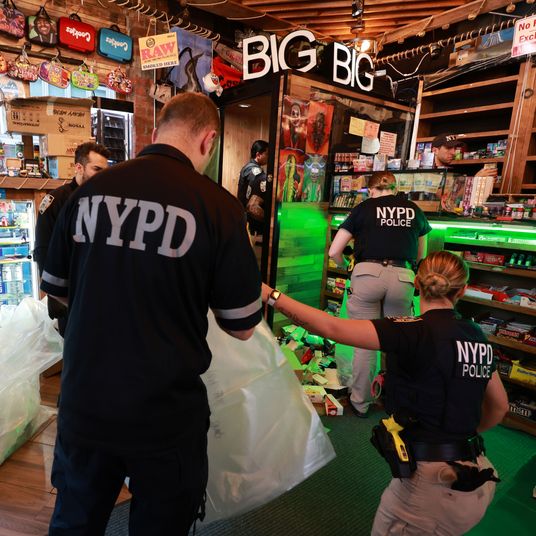
Both sides in Donald Trump’s trial in Manhattan say that the case, which technically concerns the crime of falsifying business records, is truly about politics. In his opening argument, Matthew Colangelo, an assistant district attorney, told the jury that Trump had “orchestrated a criminal scheme to corrupt the 2016 presidential election.” On Thursday, during the latest in a series of contempt hearings, Trump’s attorney Todd Blanche said he and his client “very much believe that this is a political persecution, that it’s a political trial.” While that message may resonate with Trump’s audience outside the courtroom, the jury has been hearing a very different kind of story over the past two weeks. The trial narrative is less about any election than it is about secrets — a crime of gossip.
The first two major witnesses, David Pecker, the former chief executive of American Media Inc., which owns the National Enquirer, and Keith Davidson, a Hollywood lawyer who makes his living from scandals, have offered the jurors an unusual tutorial in the way professionals obtain secrets, assess their value, and put them to use. It’s a trade that powerful men have long used to protect themselves and undermine one another. Pecker testified that in 2015, he went to Trump Tower to meet with the candidate, an old friend and Enquirer staple, and proposed to act as Trump’s “eyes and ears,” watching out for any stories “in the marketplace” that could damage him. Davidson picked up the story in June 2016, when by his own telling, the caper began with a late-night text message.
“I have a blockbuster trump story,” Davidson wrote to Dylan Howard, the chief content officer of American Media, who edited the Enquirer.
“Talk 1st thing,” Howard replied. “I will get you more than ANYONE for it. You know why …”
Howard has not testified at the trial — he is apparently living at home in Australia and unable to travel for health reasons — but the prosecution has presented text messages to show how the scheme unfolded in real time, reinforced with commentary from Davidson, a ruddy-faced, fidgety character. By his own account, Davidson was a sort of dirt broker, who either publicized or hushed up celebrity embarrassments as the circumstances dictated. (On cross-examination, Trump’s attorneys questioned him about his reported involvement in peddling sex tapes involving Hulk Hogan and Tila Tequila and a rehab rumor about Lindsay Lohan.) Davidson and Howard were both friends and frequent counterparties. Pecker testified unapologetically that the Enquirer practiced “checkbook journalism,” and he described Davidson as one of Howard’s best sources.
In their initial exchanges, Davidson informed Howard that his client, the former Playboy Playmate Karen McDougal, had carried on a roughly nine-month affair with Trump back when he hosted The Apprentice. Although accounts of Trump’s history of philandering were not exactly a scarce commodity, he had just emerged as the surprise winner of the Republican primaries, and his secrets were suddenly in demand.
“Do you know if the affair was during his marriage to Melania?” Howard texted back.
Even better: McDougal said the affair began in 2006, when Barron Trump was an infant. According to Ronan Farrow’s book Catch and Kill, McDougal first met Trump at the Playboy Mansion and afterward got together with him for sex whenever he was in Los Angeles. Trump has always denied having the affair, but true or not, a tabloid sex scandal right before the Republican National Convention seemed like the sort of thing that might lead religious conservatives to revolt. (We were all more naïve then.) Pecker testified he thought it would be vital for Trump to take the story off the market, and he proposed to do it by buying the rights to McDougal’s story and locking them in a drawer, effectively silencing her. He had previously done this to help other politicians, notably Arnold Schwarzenegger. In 2015, the Enquirer had also done a smaller deal for Trump, paying $30,000 to a shady doorman who was trying to sell a (later-debunked) scoop about a love child.
If McDougal was believable, it would potentially make her secret much more valuable. Howard flew from New York to Los Angeles to meet Davidson at his office. While he was there, he sent frequent updates to Michael Cohen, Trump’s in-house attorney, who was playing a hands-on role. “I’m wrapping up with them,” Howard texted Cohen during the meeting. “Understand I’ve got this locked down for you. I won’t let it out of my grasp.”
McDougal was accompanied to the meeting at Davidson’s office by a few men who were acting as unofficial representatives. They said McDougal had other offers, but said she did not want to be known for sleeping with Trump. She wanted to make some money and revive her career. Howard came back to New York convinced that he wanted to make a deal. “He said she was a 12 out of 10,” Pecker testified, in a way that suggested Howard wasn’t just rating her credibility. Soon all the guys got down to negotiating her price.
Donald Trump, who is not known for his wise reflexes, is the only party to the deal who seems to have immediately recognized it would probably backfire. For decades, he had been an incessant subject of gossip columns, as well as often a source for them, giving the tabloids everything they wanted and more. (See: “Best Sex I’ve Ever Had,” New York Post, 2/16/1990.) Pecker testified that as the negotiations were in motion, Trump called him up, pulling the media executive out of a meeting with investors in his company to tell him he opposed paying hush money. “I don’t buy any stories,” Trump said, according to Pecker. “Anytime you do anything like this, it always gets out.”
Soon afterward, though, Pecker testified that Cohen called him back and assured him he would be handling things for “the boss.” They came to an understanding, he testified, that American Media would sign a contract with McDougal, then transfer ownership of her exclusive story rights to an LLC controlled by Cohen in return for reimbursement. Still, Pecker showed some reluctance about going through with the deal. Howard and Davidson haggled for weeks via text. The lawyer claimed that McDougal was getting pressure from “the estrogen mafia” — her female friends — to go public by taking a competing offer from ABC. The network couldn’t offer explicit payment, but Davidson said McDougal was under the impression that she might end up with a slot on Dancing With the Stars.
“Get me a price,” Howard texted. “All in. Consulting gig perhaps as a fitness expert thrown into the mix.” Davidson asked for a $1 million up-front payment, plus a $75,000-a-year contract.
“I’ll take it to them but thinking it’s more hundreds than millions,” Howard replied. He said he would talk to McDougal about promotional opportunities American Media could offer by placing her in its fitness magazines, promising to “lay it on thick for her.”
“Good,” Davidson replied. “Throw in an ambassadorship for me. I’m thinking the Isle of Mann [sic].”
Howard managed to knock McDougal’s price down to $150,000, far less than what she had originally asked for, but still much more than the Enquirer usually paid for stories, especially ones they didn’t plan to publish. Pecker said he did the deal for one reason: “We didn’t want the story to embarrass Mr. Trump or embarrass or hurt the campaign.” That “we,” he testified, included Cohen, who was supposed to pay him back. But then, just as the deal was about to close, American Media’s general counsel vetoed the arrangement, presumably because it looked like it could easily be interpreted as an illegal campaign contribution. Pecker told Cohen his company would make the payment and keep the rights, voiding their transfer agreement. For Trump, it was a great outcome: all the hush, no money.
“Ok we are paying,” Howard texted Davidson. “Glad it all sorted … Fucken Jesus.”
Throughout the negotiations, the pair had communicated with the fluency of experienced brokers, griping about the people they represented and rolling their eyes at the buffoonish antics of their common frenemy, Cohen. “He’s hopeless,” Howard wrote. “Oh well. Another one done!” For them, the middlemen, there would always be a next deal. That same June, right as they were in the midst of trying to sort things out with McDougal, Howard texted Davidson to say that he had heard from a mutual contact, Gina Rodriguez, a porn star turned talent manager.
“FYI,” Howard wrote, “Gina is trying to hawk Stormy again.”
Stormy,” as we all now know, is Stormy Daniels, an actress whose credits include Breast Friends 2 and Dirty Minds. Her acquaintance with Trump is indisputable. The DA’s office called Rhona Graff, Trump’s longtime personal assistant, to the stand to testify that she had seen Daniels around his office at Trump Tower at least once. Her contact information was also in Trump’s virtual rolodex. Daniels has claimed that she and Trump had sex once, at a celebrity golf tournament, also in 2006. Trump denies it happened, but for the purposes of his prosecution, it hardly matters whether Daniels was telling the truth — the transaction is the root of the crime Trump is charged with, 34 counts of falsifying records related to a deal brokered by Michael Cohen.
An item about the alleged Daniels encounter had first appeared on a gossip website called The Dirty in 2011. Davidson, who was friendly with Rodriguez, had sent the publication a cease and desist letter and the item was taken down. Five years later, though, Daniels and her manager saw an opportunity to monetize her piece of Trump’s history.
“Are you working in favor of trump?” Rodriguez asked Howard.
The editor told her that Pecker had endorsed him, but that he was open to pitches.
“Depends what it is!”
“Stormy Daniels,” Rodriguez wrote.
“Is she ready to talk? I though [sic] she denounced it previously.”
“She’s had sex with him. She wants 100k.”
The Enquirer was not interested in buying her story at that price in the summer of 2016. Then, that October, an external event jump-started negotiations. The Washington Post published the Access Hollywood tape, and women started coming out of the woodwork to accuse Trump of sexual harassment and worse. It appeared as if Trump’s candidacy might not survive. “Trump is fucked,” Howard wrote Davidson. “Wave the white flag. It’s over, people!”
That same day, October 8, Rodriguez let Howard know Daniels was still in the market. She said Good Morning America and the Daily Mail were interested. Her price was now $250,000.
“You have that bid?” Howard asked.
“Yes working on it.”
Howard was skeptical. He knew that by network policy, ABC could only compensate Daniels in roundabout ways; for instance by licensing photos. He promised that he could provide a more straightforward deal. “I will tie up ASAP if we can get a realistic price,” he wrote. Over the course of two minutes, they exchanged a series of numbers and “LOLs” before converging.
“120,” Howard wrote.
“Sold,” Rodriguez replied.
When Howard called up his boss, though, Pecker balked. “I said, ‘We already paid $30,000 to the doorman, we paid $150,000 to Karen McDougal, and I am not a bank,’” Pecker testified. He worried that if it got out that he was doing business with porn stars, it would look bad for his company, which depended on supermarkets and chains like Walmart for newsstand distribution. He directed Howard to call Michael Cohen. He wanted to be Trump’s fixer, so here was a problem for him.
Cohen has yet to testify, but already he has emerged as a colorful character in the trial narrative. “He liked to call himself a fixer, or Mr. Fix-it,” Hope Hicks, Trump’s former communications director, testified Friday. “It was only because he first broke it.” Davidson testified that he had first encountered him back in 2011, when The Dirty published its post, and Rodriguez called him up to say that “some jerk” had called her up, threatening to sue.
“Who was that jerk?” prosecutor Joshua Steinglass asked.
“It was Michael Cohen,” Davidson replied, deadpan, getting a laugh from some jurors.
The prosecution seems to be trying to inoculate the jury, so that when it finally meets Cohen, it will know what to expect. In the days after the Access Hollywood tape emerged, Trump’s attorney threw himself into a furious cover-up effort. Howard connected him via text to Davidson, who represented Daniels in negotiations. “He was highly excitable,” Davidson said. “Sort of a pants on fire kind of guy.” He compared Cohen to the easily distracted dog from the animated movie Up, and said he would sometimes conduct two conversations simultaneously, with phones at each ear. Although Davidson testified that Cohen never explicitly said that Trump was funding the deal, he had no doubt about who was on line two.
“It was part of his identity and he let me know it every opportunity he could,” Davidson said, “that he was working for Donald Trump.”
Davidson drew up what he described as a standard contract, using pseudonyms for the parties, who were named only in a side letter that was supposed to remain solely in Cohen’s possession. The sale price was bumped up by $10,000 to cover his attorney fees. Davidson waited for the $130,000 wire to arrive. It didn’t come. He called up Cohen, who was full of excuses. His email must have gotten caught in the firewall. It was Yom Kippur. “My guy is in five fucking states today.” Davidson began to suspect that Cohen “was trying to kick the can down the road until after the election,” when the secret would lose its value.
Davidson told Cohen the deal was off. Daniels resumed talks with other buyers, and rumors about her story began to circulate, eventually making their way to Hicks and the Trump campaign. Cohen freaked.
“I can’t believe Cohen let this go,” Davidson texted Howard. “It’s going to be a shit show.”
“All because Trump is tight,” Howard replied.
At this point, Howard returned to David Pecker to tell him that if Daniels went public, it would “look awfully bad for everyone.” Pecker agreed. Cohen told Davidson the deal was back on and the Enquirer would foot the bill. The Enquirer guys said hold on a second. They thought Trump was paying.
It went back and forth like that for a couple of days. Finally, Davidson testified, Cohen got fed up and declared: “Goddamn it, I’ll just do it myself.” On October 26, two weeks before Election Day, he went to his bank and opened an account in the name of a newly formed company, Essential Consultants LLC. He took out a home equity loan in the amount of $131,000 and wired Davidson his money the next morning. The deal was done. Unfortunately for Cohen and Davidson, while they were buying silence from one woman, the cat was coming out of their other bag. On November 4, The Wall Street Journal, citing “people familiar with the matter,” reported that the Enquirer had paid McDougal for the story without the intention of publishing it, introducing its readers to an old tabloid term: catch and kill.
Cohen texted Pecker, telling him to expect a call from “the boss.” Pecker testified that Trump was livid with him. “How could this happen?” he said Trump demanded to know. “I thought you had this under control.” He accused Pecker or one of his minions of leaking the story. Pecker told him “there was no way on earth” the call had come from inside his building. (This April, Howard’s then-deputy, Lachlan Cartwright, revealed he was one of the Journal’s sources in a New York Times Magazine cover story.)
The leak did not end up making a difference, at least at the time. On Election Night, as the swing states started to be called for Trump, Davidson texted Howard again.
“What have we done?”
“Oh my god,” Howard replied.
In his cross-examination of Davidson, Trump attorney Emil Bove sought to undermine any connection between his client and the seamy story told by the texts.
“You’ve never met President Trump, correct?” Bove asked.
“Never,” Davidson said.
“You’ve never spoken to President Trump?”
“Never.”
Then Bove asked: “What does the word extortion mean to you?”
The evidence suggests that Trump, being practiced in matters of gossip, managed to keep himself distanced from the negotiations. Pecker testified they never communicated in writing. Only Trump and Cohen know what they said to each other. To quote Billy Martin: One’s a born liar and the other’s convicted. The evidence introduced in the trial so far presents an ambiguous picture of their codependent relationship. Cohen put his career — and his home equity — on the line to do the deal with Howard and Davidson, but they soon discovered Trump’s fixer could not even score them tickets to the inauguration.
That December, Davidson testified, he received a despondent call from Cohen. He said he vividly recalled the conversation, because it occurred at “this strangely decorated department store” with huge displays done in a trippy Alice in Wonderland vein. Cohen had told him he hoped to be named White House chief of staff or even attorney general. Instead, he had been informed there was no payoff for him. Trump had not even bothered to reimburse him the $130,000.
“He said something to the effect of,” Davidson testified, “Jesus Christ, can you fucking believe I’m not going to Washington? After everything I’ve done for that fucking guy.” He said he worried that Cohen might kill himself. Davidson testified that he looked at the giant stuffed animals around him and felt “a very odd feeling.” They were down the rabbit hole, and Cohen was digging himself deeper.
More on the trump trial
- What Happened in the Trump Trial Today: The Defense Rests
- Trump’s Lawyer Asked Me How He Is Doing — Here’s My Answer
- Running From Inside






